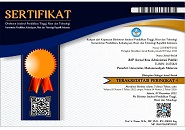Collaborative Governance dalam Program Rehabilitasi Sosial Rumah Tidak Layak Huni di Kota Surabaya
Abstract
Keywords
Full Text:
PDFReferences
Adi, K. K. A., & Shobaruddin, M. (2022). Koordinasi Pada Pelayanan Rehabilitasi Sosial Rumah Tidak Layak Huni Kota Surabaya. Jurnal Ilmiah Administrasi Publik (JIAP), 8(3), 281–286. https://doi.org/https://doi.org/10.21776/ub.jiap.2022.008.03.4
Ansell, C., & Gash, A. (2007). Collaborative governance in theory and practice. Journal of Public Administration Research and Theory, 18(4), 543–571. https://doi.org/10.1093/jopart/mum032
Asurah, W., & Wibawani, S. (2023). Collaborative Governance Pengembangan Objek Wisata Air Embung “Bandung Bondowoso” Kabupaten Bojonegoro. Jurnal Darma Agung, 31(3), 167. https://doi.org/10.46930/ojsuda.v31i3.3206
DPRKPP Kota Surabaya. (2023). Rekap Rutilahu 2022 dan Non APBD Rutilahu 2022. Dinas Perumahan Rakyat dan Kawasan Permukiman, serta Pertanahan Kota Surabaya.
Emerson, K., & Nabatchi, T. (2015). Collaborative Governance Regimes (1st ed.). Georgetown University Press.
Fairuza, M. (2017). Kolaborasi antar Stakeholder dalam Pembangunan Inklusif pada Sektor Pariwisata (Studi Kasus Wisata Pulau Merah di Kabupaten Banyuwangi). Kebijakan Dan Manajemen Publik, 5(3), 1–13. http://journal.unair.ac.id/KMP@kolaborasi-antar-stakeholder-dalam-pembangunan-inklusif-article-11728-media-138-category-8.html
Garvera, R. R., Arifin, F. S., & Fazrilah, A. N. (2021). Collaborative Governance Dalam Mewujudkan Desa Mandiri. Dinamika : Jurnal Ilmiah Ilmu Administrasi Negara, 8(3), 502–513. https://doi.org/http://dx.doi.org/10.25157/dak.v8i3.6603
Islamy, L. O. S. (2018). Collaborative Governance Konsep dan Aplikasi. Deepublish.
Islamy, L. O. S., & Andriani, R. (2022). Proses Collaborative Governance dalam Pengelolaan Dana Desa. Jurnal Administrasi Negara, 28(1), 1–23. http://journal.stialanmakassar.ac.id/index.php/jurnal_administrasi_negara/article/view/1678
Kurniadi. (2020). Collaborative Governance dalam Perspektif Infrakstruktur. Deepublish.
Miles, M. B., Huberman, A. M., & Saldana, J. (2014). Qualitative Data Analysis. SAGE Publications Inc.
Novriansyah, M. F., Mukhlis, M., Budiono, P., & Poniasih, N. K. (2021). Kolaborasi Pemerintah Kampung dengan Perusahaan Tapioka Dalam Mencegah Pencemaran Lingkungan Hasil Pengelolaan Singkong Collaboration of Kampung Government with Tapioca Companies in Preventing Environmental Pollution of Management Cassava. Jurnal Ilmu Pemerintahan, Administrasi Publik, Ilmu Komunikasi (JIPIKOM), 3(2), 81–91. https://doi.org/https://doi.org/10.31289/jipikom.v3i2.673
Peraturan Daerah Kota Surabaya Nomor 2 Tahun 2012 Tentang Penyelenggaraan Kesejahteraan Sosial, Pub. L. No. 2 (2012). https://peraturan.bpk.go.id/Home/Details/23008
Peraturan Walikota Surabaya Nomor 9 Tahun 2022 Tentang Rehabilitasi Sosial Rumah Tidak Layak Huni Kota Surabaya, Pub. L. No. 9 (2022).
Putri, K. Y. S. (2017). Teori Komunikasi. Nerbitinbuku.com.
Sulaiman, A. L. (2021). Proses Kolaborasi Penanganan Permukiman Kumuh Melalui Program Kota Tanpa Kumuh (Kotaku) di Kota Bandung (Studi Kasus: Kelurahan Tamansari Kecamatan Bandung Wetan). Majalah Media Perencana, 2(1), 1–23. https://mediaperencana.perencanapembangunan.or.id/index.php/mmp/article/view/10
DOI: https://doi.org/10.31764/jiap.v11i2.17654
Refbacks
- There are currently no refbacks.
JIAP (Jurnal Ilmu Administrasi Publik)

This work is licensed under a Creative Commons Attribution-ShareAlike 4.0 International License.
JIAP (Jurnal Ilmu Administrasi Publik) terindeks di:
EDITOR'S OFFICIAL:














.JPG)



.JPG)